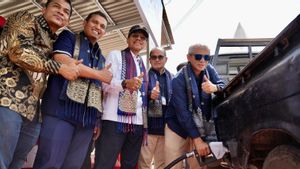JAKARTA - Nirina Zubir and his family admitted to being victims of embezzlement of land and building assets. This case involved his own housemaid or household assistant (ART). Nirina's case raises a sociological phenomenon concerning the relationship between employer and household member.
Nirina, at a press conference in South Jakarta, Wednesday, November 17, explained that the case began when the mother felt that she had lost a letter. "So ask the household assistant to take care of the letter. But instead of being processed, the letter was misused by changing the name of the ownership," said Nirina, quoted by CNN Indonesia.
According to Nirina, the case involving the land mafia has been going on since 2017. There are two land certificates and four land and building certificates that have been renamed. As a result, Nirina and her family suffered losses of up to Rp17 billion.
Nirina explained that there were three land certificate makers (PPAT) who helped her household member, Riri Khasmita, in the process of changing the name of the property located in West Jakarta. Two land certificates belonging to Nirina's mother have now been sold to third parties.
Meanwhile, Riri has pledged four building assets to the bank. Nirina said the embezzled money was used to manage the frozen food business by Riri. The business has been running for several years and now has five branches.
Helper and employer relationshipJakarta State University (UNJ) sociologist Achmad Siswanto raises an interesting point of view on the case of the embezzlement of Nirina Zubir's assets by his assistant. Siswanto views this as only possible when the employer and the helper build an intimate relationship outside of a power relationship. And this happens a lot in the context of urban life.
"At the microsociology level, the maid or household member who works at Nirina Zubir's house has a strong intensity of social interaction and social relations. On the other hand, this household member also has the skills to build those interactions and relationships well," said Siswanto to VOI, Friday. , November 19.
"This is the implication of the comfort provided in Nirina's mother's house itself. Of course, if this household member is ordered to take care of the land and other things that should be done with the nuclear family, it means that this household member has been around for a long time. And its survival is certain because the house provides comfort There is a family relationship that is built in the relationship between the employer and the household member."
We are trying to confirm about this relationship to Nirina's family and attorney. However, as of this writing, there has been no answer.

Out of the context of the Nirina case, Rey Sitompul (24) briefly described his relationship with the housemaid. "My relationship with Ms. is, I am a maid. Ms. is the employer," he said to VOI, Friday, November 19.
At home, Rey lives with three of her older brothers and the maid. Busyness and his brother made them rarely at home. The maid was given her true freedom. But in some cases, that freedom actually makes the maid out of control.
This is similar to the story of Wahyu Bisma (30) and his assistant at home. According to Wahyu, the maid has a special room in the middle of her family. Unlike Rey, the relationship between Wahyu's family and the maid grows over time. The assistant, said Wahyu, has worked for at least 20 years.
"You know, when I was a kid, I was scolded when we passed by when he was mopping. So it's like family. Sometimes they just hold the TV remote. Not the mother," Wahyu said to VOI with a chuckle.
Dita Mariana (36) brought a story about her maid at home. Dita, who works as a pharmacist at a private hospital in Depok, West Java, admitted that she always tries to give the best treatment for her assistants.
Not only that. For almost five years, said Dita, she and her husband have also often helped the needs of the maid's child. Making the maid comfortable and feeling good is important, she says. This can not be separated from the role of his assistant who doubles as a babysitter.
"For me, it's simple. I have to treat Teteh (the maid's nickname) well because I want Teteh to take care of Mahir really like her own child. So Teteh must feel like this is her family too, right."
"When you think about it, I don't want to stay at work in a chaotic condition, for example, in my mind. Then God willing, he will tell Mahir," said Dita to VOI, Friday, November 19.

Returning to the sociological study, Siswanto explained the initial conception of the auxiliary role as a part that participates in carrying out functions in a company. Helpers play a lot of roles, at least in dealing with household domestic problems. Everything related to wells and kitchens.
"So if we look at the family, it's like an organ. We make an analogy like that. There is a heart. There are lungs. Everyone works to carry out their respective functions. But when a husband and wife work, there is one function that cannot work, for example the function domestic. Washing. Cooking. And the maid is there," Siswanto.
And the attachment between a family and a servant, as experienced by Wahyu, occurs a lot, especially among urban families. According to him, the life of the urban community requires them to be busy. There were untouched spaces, filled with the presence of the maids.
"That's because families, especially in urban areas, have a high volume of activity. Husband and wife work. Leave early in the morning. Return at night. Then domestic (cooking, washing, cleaning) is untouched," said Siwanto.
Meanwhile, regarding what happened to Dita, Siswanto described this as a symbiosis of mutualism. Informal relationships are indeed important because the position of helpers in family institutions is not just workers. He plays intimate roles at close quarters with every member of the family.
"Of course, informal relationships, family relationships, that need to be built. Hopefully the employer will get feedback. He can work well."
Nirina Zubirs asset embezzlement legal process
Police have named five suspects. Three have been detained. Two more were immediately summoned by investigators. The Head of the Harda Sub-Directorate of the Directorate of Criminal Investigation at the Metro Jaya Police AKBP Petrus Silalahi said that one of the suspects who had been detained was Riri Khasmita, a former household member of Nirina's mother.
Riri is the mastermind of the land mafia conspiracy that befell Nirina and her family. Another suspect in this case is a notary who participates in the process of buying and selling land certificates.
For their actions, the five suspects were charged with Article 378 of the Criminal Code and/or Article 372 of the Criminal Code and/or Article 263 of the Criminal Code with a penalty of up to five years in prison. The police have also opened up opportunities for the imposition of articles on money laundering crimes (TPPU).
"We cover (the land mafia case) with the Money Laundering Law ... So for the flow of funds, we suspect that there must be something for business. But we have to talk about the facts... We suspect (there is money laundering offence). Investigators are still studying," said Peter.
*Read other information about LEGAL CASES or read other interesting articles from Rizky Adytia Pramana and Yudhistira Mahabharata.
Other BERNASThe English, Chinese, Japanese, Arabic, and French versions are automatically generated by the AI. So there may still be inaccuracies in translating, please always see Indonesian as our main language. (system supported by DigitalSiber.id)







